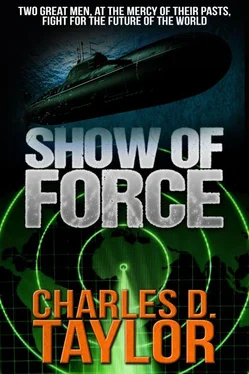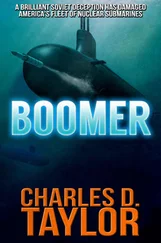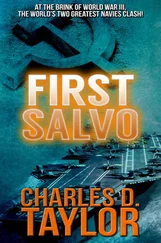Another voice broke in. "Tomcats have fired on the remaining Rigas, sir." David looked up at the screen, but found it was taking him a moment to reorient. He saw the two dots representing his own aircraft, and three for the Rigas, but there appeared to be missiles fired from both groups. At about the same time that two of the Russian planes were obviously hit, one of the Tomcats disappeared from the screen. As if in answer to his next question, he heard, "Pilot in the water. Josephus Daniels has helos out for recovery."
"Bill, I'd like to get a feedback from War Games as soon as possible on their tactics. As far as I can see, their naval air just doesn't have enough experience, but then we're not so hot in defending ourselves against their damn missiles."
"Yes, sir." Dailey bent forward slightly and picked up a sound-powered phone, speaking briefly for a moment. He waited. His eyebrows knit together. He spoke briefly and replaced the instrument in its cradle. "Problems with computer relay, Admiral. Computer officer is checking it out again, but our equipment seems okay. He says the only other problem could be in their equipment at Johns Hopkins, but they have backup. Unless something's happened to the satellite relay." He raised his eyebrows in question.
"Call him back, Bill. Tell him not to worry about his computers, if they check out. And you might tell him it's probably not Hopkins either."
Admiral Alexander Kupinsky leaned forward, cradling his chin in his hands and resting his elbows on the deck railing of the signal bridge, one level above the pilothouse. He surveyed the maze of radars, missile launchers, and antiaircraft guns before him. Lenin was as well equipped to fight off an attack as a cruiser, with her array of surface-to-air, surface-to-surface, and antisubmarine missiles. She also carried torpedoes and rockets in case of close-in attack, but her main armament was still her aircraft. Built as his flagship, she now carried 24 long-range Riga fighters, 12 short-range Forger fighters, and 25 Kamov helicopters, and she still maneuvered like a destroyer. Kupinsky had literally designed her himself, or rather he had designed the first of her class, the Kiev. There had been more than enough time.
His mind drifted back over twenty years. After his return from Cuba, where his submarine had been ordered after the Americans tired of playing cat and mouse with it, he had been given a formal hearing in Moscow. No submarine commander in the Russian Navy had been so humiliated before. Only Gorenko's personal intercession had kept him from a court-martial. As it was, the Commander in Chief of the Soviet Navy had taken a great chance. He was not a strict Party member, and there were many who would have been happy to see him go. But he had Khrushchev's ear. The two older men had much in common, and thus there was a hearing first.
The Admiral did not involve himself in the formalities, but Alex found himself with a highly efficient defense counsel, another Party member much like Gorenko. He was polite, nodded at all the details that were presented, declined to ask any questions, and gave every indication of being there just to ensure that Kupinsky received fair consideration. However, when his turn came, he had both the quartermaster's and engineer's logs in hand, and presented details from each, exactly in order as each engineering casualty occurred to the submarine. By the time he got to the American quarantine operations, the senior officers conducting the hearing were beginning to appreciate the problems of the captain of a diesel submarine in foreign waters, with a minimum of support from the homeland.
Then began the story of his longest night, the discovery by a carrier aircraft, the American destroyers, the helicopters, the sonobuoys in the water, the grenades, the incessant pinging on the hull, and the pinwheel fence that was literally thrown around him. Then, there was the inadequate air supply, the leaking oil, the shaft with the hot bearing that was about to seize. And, worst of all, there had never been any instructions from Moscow. There were no effective communications systems to explain what was happening to them. They knew that something was up with the Americans, but they had no idea whether they would be sunk or not or even if they were to fight. And finally, the man read from the log about the hours of maneuvering in Kupinsky's attempt to escape, and, after closing all the logs, he related the conditions of the boat and the men when their brave captain finally had no choice but to surface.
They could not court-martial him. No Soviet submariner had ever undergone such an action before. Gorenko had built a new fleet after the Great Patriotic War, but they had yet to take those boats into battle. They decided that Lieutenant Kupinsky had responded admirably considering the limitations he was forced to work under. However, too many senior officers knew of the surfacing. It was one of many insults heaped on them over a ten-day period by the U.S. Navy, and some action had to be taken. They sent him inland, to a university for further education. x Alex had the opportunity, before the hearing, to spend some evenings with Gorenko, discussing the quarantine and exactly what had gone wrong, and the older man had listened. Gorenko had always publicly ridiculed the American aircraft carriers, but he knew the advantages they offered in antisubmarine warfare, and suspected that a future Russian blue-water navy would need them in some form. The other point of discussion was one that Alex had always felt strongly about, and now he could speak personally about the lack of an effective service force. "AH right!" Gorenko had offered. "I'll build the service force, after we have the missile submarines. You study your aircraft carriers and come back to me with an answer. But," and he had leveled a finger at Alex, "don't bring me a big expensive American carrier."
Life at the university, five years of it, had been difficult for Kupinsky. He had been brought up as a youth in a sailor's home, he had been educated as a sailor, and he had truly become a man of the sea. He was sent far from it. There was no choice but to immerse himself in study.
The most important gain of the homeland was his research. It was during this period that he accepted the challenge to develop the aircraft carrier — but not an American type. What evolved was a challenge to the American submarine fleet. While he had been humiliated by a particular destroyer, he had been found by a carrier-based aircraft. For a submarine, there is no knowledge. of an aircraft's proximity until it has you. It doesn't matter whether it is a fixed-wing type or a helicopter, because it does not come in contact with the water until it is reasonably sure a sub is there. And then there is no longer any element of surprise, which is the submarine's greatest advantage! Then there is only escape.
So his aircraft carrier became an antisubmarine force in its own right. It would carry many helos, which were easy to store, launch, and recover from any platform. But of even more importance was the VTOL aircraft. Intelligence provided the latest in research from the British, the leaders in the vertical takeoff and landing aircraft. With the information passed on to him via Gorenko's office, he was then able to plan a ship that was three hundred feet shorter than the American carriers, and half the tonnage. With the limited space required for flight operations, he was able to add the protective and offensive weapons that American carriers depended on their escorts for. The carrier would bristle with missile launchers to counter attacks from the air, surface, or subsurface, and it was especially built as a sub killer. The Kiev-class aircraft carrier became a reality on paper. The air-strike capability would come later, as long as the planes could be adapted to the available platform.
Читать дальше












